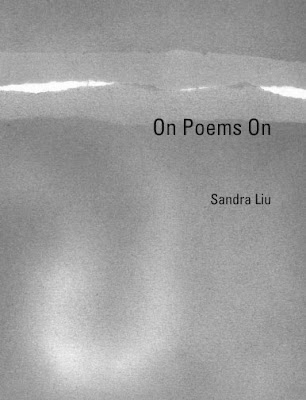GENEVIEVE KAPLAN Reviews
On Poems On by Sandra Liu
(Ugly Duckling Presse, 2012)
Sandra Liu’s short collection On Poems On is part travel-journal,
part-scientific record, part-protest, part magical diary, and all really captivating.
The poems included here seem carefully observed and located; they take readers
to a Mongolian volcano, for example, or off the Australian continental shelf.
And the objects in the poems, too, are similarly precise: trees are not merely
pieces of forest but are “unified by an extended root system underground” (6);
the rocks are magnetite, olivine, garnet, limestone, and gypsum (8). Liu’s
poems, though, go beyond displaying her scientific knowledge. Instead, she uses
technical and geographical information to underscore potentially fascinating
juxtapositions. In the poem “Static” Liu describes, in flat language that could
be taken from a wire report or a geological tract,
Security
forces under orders
to
shoot provocateurs on sight returned relative
calm
to another day of sectarian violence.
Lying
between these 2 relatively stable areas
is
a large unstable area where land
and
sea alternate sharply and the ocean bed descends
to
extremes— (4).
Liu’s parallel of the
“stabilized” violence of the humans aboveground and the extreme sharpness of
the ocean floor is where we find the poetry of the passage, and throughout the
chapbook she excels at showing readers how “two events [are] part of one story
and also mean / two distinct stories” (6). While the use of first person is
fairly limited, Liu’s narrator is always part of the story of On Poems On, and we want to follow
her—and her experiences in places where “the shore is rocky and the sandflies
awful” (6) or “The skyscraper resembles nothing / less than a bolt of fish”
(7)—to see what happens next.
Plenty happens, often in a
charming, almost magical way. While lines like “The gargantuan / size of
indigenous spiders necessitates / special crossings” (3) may sound rather
unpoetically procedural, these are enormous spiders, after all! In a poem! And
they share space with “a man / who thinks he’s a berry” (14), a “gnat burnt
against the light,” (17), a “birch tree that is white and slender usually”
(25). The author’s attention to sound and willingness to bend reality just a
bit creates results that are quite lovely. In “I in river” Liu lets language
guide the poem, exploring “i without / River, i; i with river, / I in river;
river in me” (24).
The poems in On Poems On seem both organic and constructed, they can be
simultaneously methodical and playful, and happily, they are never predictable.
Liu’s chapbook includes such an impressive range of interests, reflections, and
techniques ; the poems move deftly between ideas as disparate as “water / cannons
of security forces” (4), “a Chinese
painting brushed with horsetail strokes” (12), “mollusk tentacles” (21), and
even Rapunzel, locked “in a tower round / by definition / also seamless” (7).
The poems here are ultimately always interested in what makes poetry more or
less poetic, and how we—as readers or writers—might explore that further. As
Liu writes in the title poem “On poems on” (a poem that is about poetry but is
also about the game of horseshoes and about grammar and about science and about
life),“Somewhere out there is the judgement that one is / Better than the other” but that any
“rules will need fleshing out” (16). Ultimately, the poems in this chapbook
explore what such a “fleshing out” could look like, and Liu’s work here urges
poems—and their readers and writers—onward.
*****
Genevieve Kaplan is the author of In the ice
house (Red Hen Press), winner of the A Room of Her Own Foundation‘s poetry
publication prize, and three chapbooks: In an aviary (Grey Book Press,
2016); travelogue (Dancing Girl, 2016); and settings for these scenes
(Convulsive Editions, 2013), a chapbook of continual erasures. Her recent poems
can be found in Colorado Review, BOAAT, and Sugar House Review.
She lives in southern California where she edits the Toad Press International
chapbook series, publishing contemporary translations of poetry and prose.

No comments:
Post a Comment